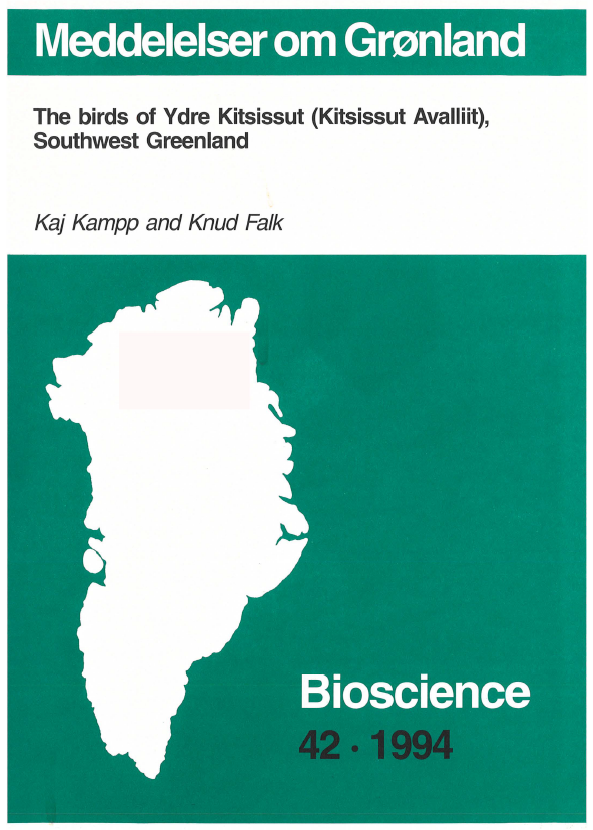The birds of Ydre Kitsissut (Kitsissut Avalliit), Southwest Greenland
DOI:
https://doi.org/10.7146/mogbiosci.v42.142577Abstract
Ydre Kitsissut (60°45-47'N, 48°25-29'W), an archipelago about 10 km off Nunarsuit in the district of Qaqortoq, is the only breeding reserve for birds in southern Greenland. However, it has only been visited by ornithologists four times: by F. Salomonsen on 3 July 1971, and by the authors for between 3 and 14 days in 1983, 1985, and 1992.
Population sizes of the most abundant species in 1992 were: Fulmarus glacialis 125 occupied sites (32% with young); Somateria mollissima about 30 nests (and 500-1000 summering birds, together with c. 100 Somateria spectabilis); Larus hyperboreus at least 100 adults with 25-30 broods of young; Larus marinus 2 pairs, one brood (but 11 pairs in 1985); Rissa tridactyla 23 pairs, no young; Uria aalge 900 birds (about 630 pairs); Uria lomvia 9000 birds (6300 pairs); Alea torda 400-500 birds; Cepphus grylle 150 pairs (very rough estimate); Fratercula arctica 200 birds.
Although numbers of Uria spp. in 1971 were reported as 61,200, there are good reasons to believe that this was a gross overestimate, and that actual numbers did not differ much from the more recent counts. Apparent population declines between 1983-85 and 1992 for Fulmarus glacialis, Larus marinus and Uria spp. may reflect a lower attendance at the colony in 1992 where the breeding success of these and most other species was low. The poor breeding performance was most likely a consequence of the cold and prolonged winter 1991/92, with persistent frost prevailing until after mid-June. In Uria spp., however, egging and associated disturbance probably was the primary cause of breeding failure; residents of nearby villages habitually take eggs on Ydre Kitsissut in spite of its status as a bird reserve.

Downloads
Published
Issue
Section
License
Coypyright by the authors and the Commision for Scientific Research in Greenland / Danish Polar Center/Museum Tusculanum Press as indicated in the individual volumes. No parts of the publications may be reproduced in any form without the written permission by the copyright owners.

